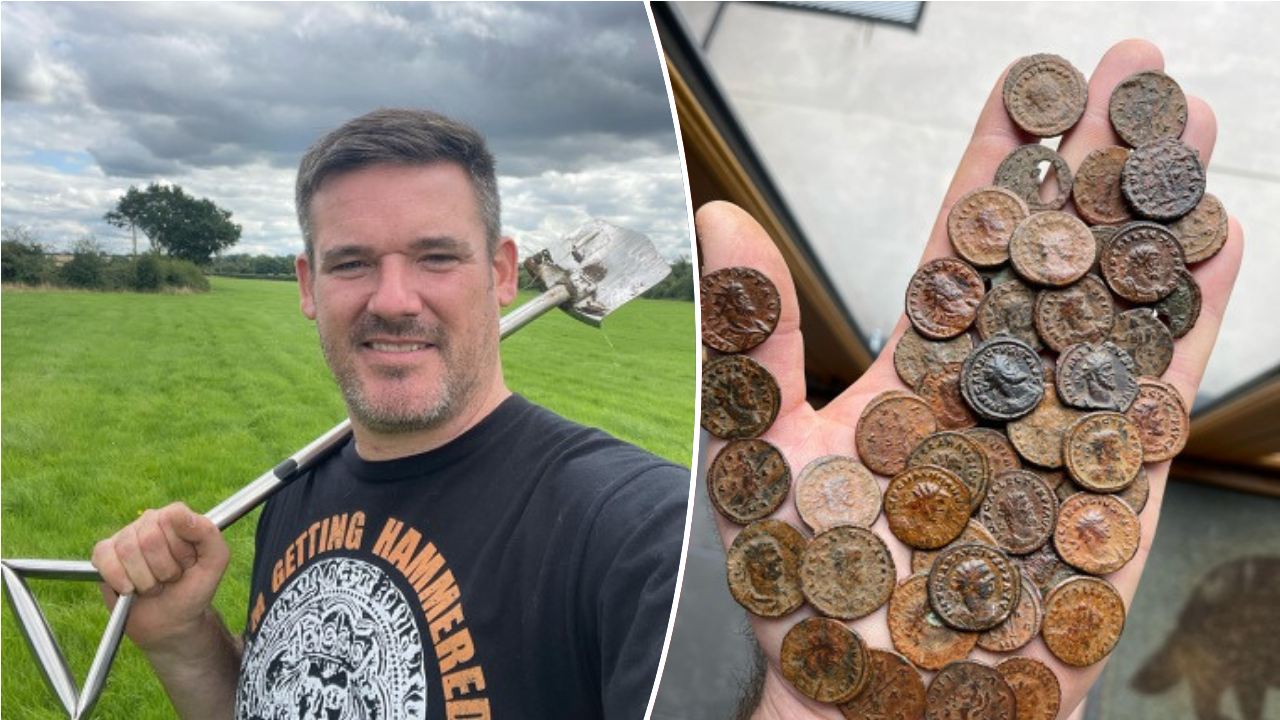Lifestyle
Plumber stumbles across hoard of ancient coins in field: ‘Once in a lifetime find’

A Plumber’s Chance Discovery: Unearthing Ancient Roman Treasure
In the heart of England, an ordinary summer’s day turned extraordinary for David Dunn, a plumber from Sapcote, Leicestershire, when he stumbled upon a piece of history that would rewrite the pages of archaeology and captivate the world. On July 19, 2023, while exploring a familiar pasture near his home, Dunn uncovered a treasure trove of 50 ancient Roman coins dating back to the Roman Empire. This remarkable find, revealed to the public only in February 2024, has not only thrilled history enthusiasts but also highlighted the allure of metal detecting as a hobby. Dunn, who had only recently taken up metal detecting earlier that year, never imagined that his newfound passion would lead him to such a significant discovery.
From Metal Detecting to History Making: David Dunn’s Journey
Dunn’s journey into the world of metal detecting began in 2023, driven by a desire to escape the confines of his daily routine and connect with nature. As a plumber, his work often kept him indoors, but metal detecting offered him a chance to “go out on his own into the fresh air after a long day working,” as Noonans Mayfair, a London-based auction house, later described. Armed with a Deus 2 metal detector and a growing curiosity, Dunn set out to explore the fields near his home. His choice of location that day was no coincidence; a gut feeling drew him to a pasture he had visited many times before. Little did he know, this intuition would lead him to a discovery that would change everything.
Using the Deus 2’s Relic Program, Dunn received a faint signal reading of 84, which caught his attention. As he began to dig, he uncovered not one, but two Roman coins. Overcome with excitement, he quickly alerted the farmer who owned the land, and together, they embarked on an impromptu archaeological dig. Their efforts were rewarded when they unearthed a staggering hoard of 50 coins, scattered across an area of approximately four square meters. “It just snowballed from there,” Dunn recalled, marveling at how a simple hobby had uncovered a treasure that had lain undisturbed for centuries.
The Treasure Trove: A Glimpse into Roman History
The coins Dunn discovered were identified as antoninianus, each valued at two denarii, the currency of the Roman Empire. The earliest of these coins dates back to the reign of Carausius, a Roman military commander who seized power in Britannia (modern-day Britain) from 286 to 293 CE, following the Carausian Revolt. Other coins bore the marks of subsequent Roman leaders, including Allectus, Diocletian, and Maximian, with the youngest of the coins hailing from the fourth century AD. The fact that many of the coins were in remarkably good condition, with clear portraits of their rulers, made the find even more extraordinary.
This discovery not only added to the historical record but also deepened our understanding of Roman Britain. Dunn’s find underscores the rich history of Leicestershire, where Leicester, the county capital, was once a major Roman settlement known as Ratae Corieltauvorum. The nearby farms, including one with a known Roman villa, have long hinted at the region’s archaeological significance. For Dunn, the excitement of the discovery was matched by the knowledge that he had uncovered a piece of history: “Many of the coins… were in really good condition with perfect portraits – it was a once-in-a-lifetime find!”
The Auction and Beyond: Preserving History for Future Generations
The significance of Dunn’s discovery extend beyond its historical value; it also opened a new chapter in the study of Roman coins. Coin expert Alice Cullen of Noonans Mayfair revealed that one of the coins, featuring a bust of Diocletian on one side and a standing woman on the other, was an entirely new variety that had never been documented before. This discovery has been recognized as a groundbreaking find, with plans to include it in an upcoming volume dedicated to Roman Coins.
The coins went under the hammer at an auction hosted by Noonans Mayfair on February 18, 2024, with estimates suggesting they could fetch over $1,800. While the monetary value is significant, Dunn remains humble and uninterested in the financial gain. “I’m not sure of what to spend it on,” he admitted, reflecting a mindset that prioritizes the love of history over material wealth. He also expressed a desire to share the proceeds with the farmer, acknowledging the challenges the farmer had faced in recent years, including the impact of the COVID-19 pandemic.
The Legacy of a Chance Find: Celebrating Amateur Archaeology
Dunn’s story is a testament to the idea that history is often just below our feet, waiting to be uncovered. His discovery not only highlights the enduring legacy of the Roman Empire but also reminds us that even the most amateur archaeologists can make remarkable contributions to our understanding of the past.
In an age where technology and modernity often dominate our lives, Dunn’s journey serves as a reminder of the profound joy of connecting with history. For him, the real treasure lies not in the coins themselves, but in the stories they tell and the mysteries they uncover. His chance discovery has not only enriched our understanding of Roman Britain but also inspired others to explore the past, proving that sometimes, all it takes is a little curiosity and a willingness to dig deeper.
As the world continues to marvel at the ancient treasure found in a pastoral field, one thing is clear: this plumber’s discovery is a timeless reminder that history is always within reach, waiting to be unearthed by those with the passion to seek it out.